|
Martial Law at Jamestown 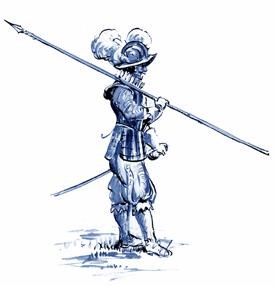
Between 1609 and 1612, Jamestown's leaders created and enforced a code which, compared with English Common Law seemed both strict and harsh. The Laws Divine, Moral and Martial were, however, necessary. The colony of Virginia had collapsed into chaos and was careening towards failure and disaster. As colonist Ralph Hamor observed in 1615, if discipline had not been restored, and quickly, "I see not how the utter subversion and ruin of the Colony should have been prevented." When order once more reigned, Jamestown could not only survive, but begin to thrive. In 1619, martial law was replaced by the forerunner of the government which Americans still enjoy today.
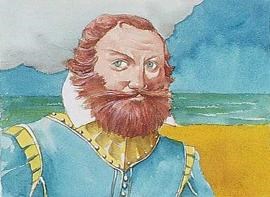
Harpers Ferry Center "As Near to the Common Laws of England ...as May Be" Virginia's first charter made an assumption which did not test out: that the new colony was but a remote part of England. This was hardly the case, as events proved. An unfamiliar environment, a native ruler who controlled most of Tidewater Virginia, and a lack of cooperation amongst the colonists themselves led to tensions and tragedies. When a strong leader such as Captain John Smith took command, the colony could function. But after Smith's untimely return to England in the fall of 1609, disease, drought, hunger, and infighting decimated the Jamestown settlers. The arrival of Lord De La Warre, Virginia's new governor, in the spring of 1610 marked the beginning of a new order: the Laws Divine, Moral and Martial.
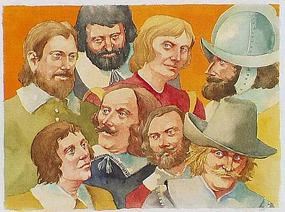
Harpers Ferry Center "Proceed by Martial Law According to Your Commission" The three men responsible for the development and implementation of the new code were Lord De La Warre, Sir Thomas Gates and Sir Thomas Dale, who had all see extensive military service. Their rule emphasized order and discipline for the three categories of colonists: officers, laborers and farmers. The thirty-seven laws (and punishments) which applied to all colonists were straightforward, and they were meant to be. As their compiler William Strachey observes, they "take away the plea of I did not know."
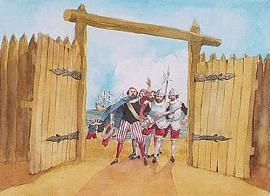
Harpers Ferry Center " ...And Perform the General Service For Which We First Came Thither" As the years passed, the colony's survival seemed more certain. The marriage of Pocahontas and John Rolfe led to much-improved relations between the two peoples. The start of the tobacco trade boded well for the Virginia Company's financial stability. More and more English decided to make Virginia their new home. Regular courts were established to try criminals. In 1619, the new Virginia Assembly, which would make laws for the colony, met for the first time. In addition to the Governor and his Council, there were about twenty representatives elected form Tidewater Virginia settlements. The Laws Divine, Moral and Martial had served their function: holding the colony together during tough times. Now, the time had come for representative government in English North America.
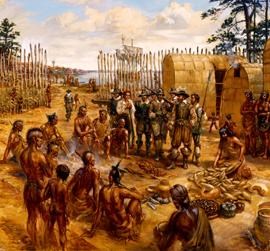
Colonial National Historical Park "How Safe, Quiet and Comely It Is To Be Honest, Just and Civil" Most of Tidewater Virginia was ruled by Paramount Chief Powhatan, the father of Pocahontas. Relations between Powhatan's people and the new arrivals in the early years ranged form friendly to tolerant to downright hostile. Unauthorized trading with the native people was forbidden, as well as running away to live amongst them. The Laws recognized the importance of maintaining the best relationship possible. The Crime: "No man shall... by force or violence take away any thing from any Indian coming to trade, or otherwise...." The Punishment: "upon pain of death."
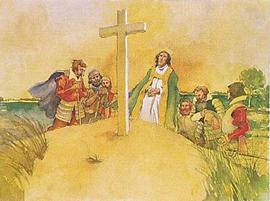
Harpers Ferry Center "The Almighty God Be Duly and Daily Served" All colonists were expected to receive religious instruction, attend services and show respect for the Trinity, the Bible and the ministers at Jamestown. The Crime: "That no man blaspheme God's holy name...." The Punishment: "... for the first offense...and for the second, to have a bodkin thrust through his tongue, and if he continue the blaspheming of God's holy name, for the third time so offending, he shall ... receive censure of death."
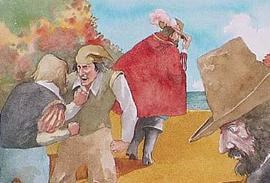
Harpers Ferry Center "That No Man Speak Impiously or Maliciously" Moral suffered without respect for the authority of King James I, the Virginia Company, governors, ministers and officers at Jamestown, as well as for one's fellow colonists. The Crime: "No man shall give any disgraceful words or commit any act to the disgrace of any person in this colony..." The Punishment: " ... Upon pain of being tied head and feet together, upon the guard every night for the space of one month, besides to be publicly disgraced himself and to be made uncapable ever after to possess any place or execute any office in this employment."
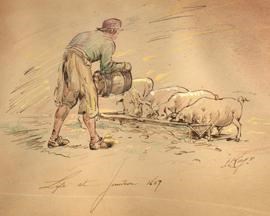
Harpers Ferry Center "Forebear to Work into Our Own Wants" Food supplies were particularly addressed in laws concerning the work of bakers, cooks and fishermen. Those thieving from private or public gardens were severely punished, as were those who slaughtered livestock indiscriminately. The Crime: " ... no man shall dare kill or destroy any bull, cow, calf, mare, horse, colt, goat, swine, cock, hen, chicken, dog, turkey ... whether his own or appertaining to another man, without leave from the General...." The Punishment: "upon pain of death in the principal, and, in the accessory, burning in the hand, and loss of his ears, and unto the concealer of the same four and twenty hours whipping...."
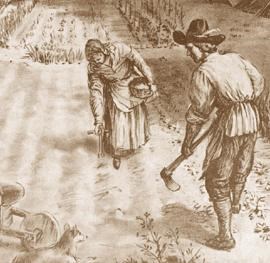
NPS Image "Shall Duly and Daily Attend His Work" Jamestown's governors were looking to the future when they cautioned colonists to care for their tools, keep their houses "sweet and clean" and to answer nature's call far from the fort. Overseers were enjoined to attend to their charges closely and working hours were strictly enforced. The Crime: "No soldier or tradesman but shall be ready ... upon the beating of the drum, to go out unto his work, nor shall he return home ... before the drum beat again." The Punishment: " ... for the first fault to lie upon the guard head and heels together all night, for the second time ... to be whipped and for the third time so offending to be condemned to the galleys for a year." |
Last updated: February 26, 2015
